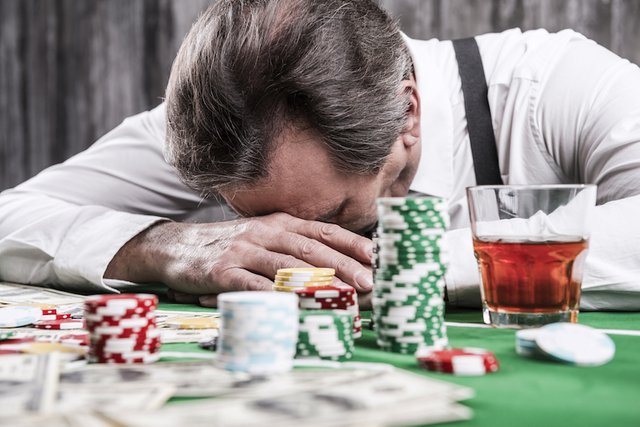Is Gaming the New Gambling? - Man embezzles $4.8 million from employer, Spends $1m on Mobile Game

Introduction:
The global games market is estimated to worth almost $100 Billion dollars a year. At least 37% of this comes from mobile gaming and that figure is increasing (source) - it is up 8.5% compared to the previous year.
The issue of "gaming addiction/dependency" and people spending excessive quantities of money on mobile games is something we are hearing about more and more frequently.
I read about a fascinating court case today when catching up on news from the past week that is particularly pertinent to this.
Here is the article link from Ars Technica by David Kravets:
California man spent $1 million playing Game of War
Excerpt from the Ars Article:
A 45-year-old California man pleaded guilty in federal court Thursday to ripping off $4.8 million from his employer. Notably, the man admitted to spending $1 million of that bonanza on Game of War (GOW).
The mobile-phone game is developed by Machine Zone and heavily advertised by model Kate Upton. It's one of the top-grossing mobile games in the world, according to Adweek. And now we know why, at least in part.
Game of War - 2015 SuperBowl Advert ft. Kate Upton
Further Discussion
This is a very odd case and I'm sure we will get more information on it once the case is concluded. Even though he didn't spend all the money on GOW - the $1m he spent has to rank as some kind of record.
In the past we would often hear of people embezzling money and spending it on gambling.

More recently I think we have all heard those stories of kids spending several hundred dollars on mobile games.
This case is on another level although ironically this man used someone else's money to do it too - not his parent's money but money he embezzled from his employer.
I have never played this game but it seems "Game of War" has some very effective methods of getting people to spend money.
Venturebeat Article on GOW

Here is a quote from a Venturebeat article from April 2016:
Of course, a lot of games do stuff like this, and part of Machine Zone’s success is that other studios haven’t figured out how to duplicate its money-making techniques. It’s also likely that Game of War has a disproportionate number of whales compared to those people who put just a few dollars in. The game heavily favors big spenders, and the top whales are a hundredfold more powerful than the common player who puts little or no cash into Game of War.
According to that article the average mobile gamer spends $86.50 on in game purchases. The average Game of War user spends $550 - over 6 times more:
A $550 annual average is insane, but Machine Zone has definitely mastered certain aspects of getting people with a lot of money to part with huge chunks of it. A big part of this, as analytics firm ThinkGaming points out, is that Game of War has a lot of depth for big spenders. The app has a multitude of systems that players need to engage with to ensure they have an army prepared for the next big multiplayer battle. But those systems are slow, and players can speed them up by spending cash.
So far it doesn't sound that different from other games that time limit free play or progress if you don't spend.
Cracked Article from 2015

An article in Cracked - 5 Reasons I Lost $9,000 On An iPhone Game by Jason Croghan from 2015 goes in to some details as to why players may spend so much on GOW in particular:
At first, it's harmless fun, and, yes, I realize I sound like a drug addict. Like many casual games, you have to wait a certain amount of time before a building is complete or certain technology is researched. The timers start low, so you can play for a few minutes every day and make decent progress.
What he initially details is a very clever method of hooking people into parting with money which differs little from other mobile games.
These are very similar to the techniques used in casinos and gambling establishments. They are based on well established practices and I think many of us are familiar with them.
Why is GOW even more effective at then? I think the real difference with GOW is detailed here:

In most games, if you spend money, the benefits are permanent. Your Cloak Of Questionable Financial Management may have cost 40 bucks, but no one can ever take it away from you. But, here, you're spending money on troops and other expendables that can be lost in combat. I was casually browsing the map at work recently and came across a guy who must have spent at least 7,000 Euros. He wasn't around to defend himself, so we attacked. We wiped out about 2,500 Euros. Two-and-a-half grand, gone in five minutes.
This is a very small and subtle difference but it may well be what causes a huge difference in how people spend their money and the risk/reward balance for players.
I think in this case the result is a game that is even more similar to gambling.
For example any money that you put into a gamble is permanently lost once it spent - similar to losing troops in the game.
It is not exactly the same but the psychological effects and manipulative properties are likely to tap into the same neurological and psychological mechanisms as detailed below:
Scientific American Article

People may be encouraged to spend more in an attempt to chase a loss in a way that they may not with other mobile games.
The following excerpt is from a Scientific American article "How the Brain Gets Addicted to Gambling":
Addictive substances keep the brain so awash in dopamine that it eventually adapts by producing less of the molecule and becoming less responsive to its effects. As a consequence, addicts build up a tolerance to a drug, needing larger and larger amounts to get high. In severe addiction, people also go through withdrawal—they feel physically ill, cannot sleep and shake uncontrollably—if their brain is deprived of a dopamine-stimulating substance for too long. At the same time, neural pathways connecting the reward circuit to the prefrontal cortex weaken.
It has become clearer over the years that "problem gambling" acts on the brain of gamblers in the exact same way as a drug like heroin, cocaine or alcohol would.
"Problem gaming" is likely to work in exactly the same way.
Drugs and hence gambling high-jack the neural and chemical pathways that are normally there to reward us for evolutinarily productive behaviours like eating, sex and so on:

Just as substance addicts require increasingly strong hits to get high, compulsive gamblers pursue ever riskier ventures. Likewise, both drug addicts and problem gamblers endure symptoms of withdrawal when separated from the chemical or thrill they desire. And a few studies suggest that some people are especially vulnerable to both drug addiction and compulsive gambling because their reward circuitry is inherently underactive—which may partially explain why they seek big thrills in the first place.
I suppose the real question and something we run into again and again is why some people are more susceptible to this than others?
Why do some people seem to develop problems with addiction to gaming, gambling, alcohol etc. yet others can do these activies without them getting out of hand?
A few studies suggest that some people are especially vulnerable to both drug addiction and compulsive gambling because their reward circuitry is inherently underactive—which may partially explain why they seek big thrills in the first place.
A 2005 German study using such a card game suggests problem gamblers—like drug addicts—have lost sensitivity to their high: when winning, subjects had lower than typical electrical activity in a key region of the brain's reward system. In a 2003 study at Yale University and a 2012 study at the University of Amsterdam, pathological gamblers taking tests that measured their impulsivity had unusually low levels of electrical activity in prefrontal brain regions that help people assess risks and suppress instincts. Drug addicts also often have a listless prefrontal cortex.
These differences are likely to have some genetic basis but I don't think we can discount phenotypic input from things like personality and environment.
Further certain illnesses may make it worse e.g. Parkinson's Disease where the same mechanism may be at play to some degree. In PD the main types of neurones affected are those that predominantly produce and relate to dopaminergic transmission:
Over the decades researchers noticed that a remarkably high number of Parkinson's patients—between 2 and 7 percent—are compulsive gamblers.

The article also suggests giving people the ability to ban themselves from Casinos as a strategy for helping to treat addictive behaviours. This would be in addition to conventional psychiatric treatments like Cognitive Behavioural Therapy.
I wonder if giving people the same option on games like GOW might also be of help?
I believe some games already let you set limits on how much you spend. Perhaps that is not enough? Perhaps an option to permanently ban yourself might be more effective?
I understand that this would not be simple and there would probably be ways for people to get round it.
It might still act as at least a partial barrier to create resistance though and make it easier for people to avoid the problem behaviour.
Conclusions

The mobile gaming market is huge and it seems that game developers are getting more and more skilled at squeezing money out of players by using the same techniques that casinos use.
When a man can spend $1m on an online game do we have a problem?
What do you think?
Do you have any experience of these issues? Have you spent a huge amount on a mobile game? Have you played GOW?
Can anything be done to prevent these kind of issues? Should it?
Have your say in the comments:
Thank you for reading.

If you like my work please follow me and check out my blog - @thecryptofiend
All uncredited photos are taken from my personal Thinkstock Photography account. More information can be provided on request.
If you liked this you may also like:
- Buy When There is Blood in the Streets - Perception, Framing & the Power Down Paradox
- STREEM - An Idea for a Music Streaming Service on the Steem Blockchain
- Sometimes it takes a crisis to reveal the truth
Are you new to Steemit and Looking for Answers? - Try https://www.steemithelp.net.

Interesting. I can tell you that gamification is being used extensively by governments and corporations all over the world. A dull factory job can easily be made fun for a worker if they think they're playing a game for 8 hours a day. Btw, here's an example of gambling addiction leading to dishonesty from our own Steemit. Sadly this time it's the 'bookmaker'... https://steemit.com/steemsports/@nikflossus/alert-betting-account-run-by-a-trusted-member-of-steemit-found-to-be-a-scam
I suppose in that way it is a positive use in some ways.
Thanks I will take a look:)
I lost my home to "Travian", not me playing it but my wife. I lost everything, because she took it to keep me from complaining about her online addiction. Women can do that still. This was like 8 years ago when most people still didn't get online addictions. She was spending a lot of money on "gold" and we were getting calls from bills we couldn't pay. When I tried to talk to her about it once, the first and only time, she went to work (she was playing at work) typed up a raft of false complaints against me and a short time later I was divorced with only what I could pack in my car.
I could have taken the house and probably more, but she got custody of my son and I didn't want to upset that for him. Fortunately he was almost ready for college and is now out of there. According to him she is still playing and spending up to half her monthly salary on it.
The real power of these things is that the game keeps moving when you are offline, calling you back to it so you won't get left behind
Wow thanks for sharing your experience.
Yes for sure. The drive to not miss out is in itself quite powerful.
When I first read your article i was assuming that the money "spent" on the game was being laundered...there is a technique of money laundering which uses the virtual currency or markets in MMO's to move the illegal assets.
But "Game of War"?
As a former gamer (7 years wasted on WOW), I can understand the dopamine rushes, but a million bucks on a tablet game? WOW!
Some additional reading on money laundering via online games (including online gambling):
http://ro.ecu.edu.au/cgi/viewcontent.cgi?article=1004&context=icr
http://lawofthegame.blogspot.com/2007/09/mmog-massive-moneylaundering-online.html
https://papers.ssrn.com/sol3/papers.cfm?abstract_id=987056
http://www.mcafee.com/in/resources/white-papers/wp-jackpot-money-laundering-gambling-summary.pdf
Cool. Thanks I hadn't even considered the money laundering angle. In this case it sounds like a case of addiction but thanks for the links I will take a look:)
I don't think there is even an aftermaket for Game of War, so I think it's addiction, too. In these articles they discuss terror financing via this method of laundering, but the terrorists actually use an exchange method called hawala.
Yes. Interesting. I will put these things on my list to read (which is crazy long right now). May be a good subject for a future post (unless you want to cover it). Thanks for the links:)
Actually, gambling has already be referred to as gaming in some news I've seen.
So, I think in gaming which involves some exchange of something or some currency, it's pretty much some kind of gambling.
Yes I know some people call it gaming.
I feel like writing a new video game.
Power it with Steem if you do.
As a big gamer myself, I've kept a close ear to all the problems regarding "free-to-play" models like Candy Crush for the past few years, especially since it has begun to heavily affect premium console game development. I've always seen it as worse than gambling as these companies are making a bulk of their profits from children who use their parents' credit cards. These games are highly engineered to be addictive and profitable. I think there has to be a lot of public discourse and new legislation on this part of the tech industry.
Great article, would love to see more in the future! Followed
Yes it is unethical to sell what is pretty much like gambling to kids. I think we have all heard those horror stories on the news where a parent receives a huge bill for something they didn't buy.
Thanks:)
RS for you.
Ha, I am not a gamer and never have been. I am not the target market here LOL.
I would like some STEEM today, I know that! Down to 16¢ USD as I am typing.
Thanks! I've put down an order at 10 cents. Hopefully it gets met:)
I would love to hear your thoughts on all this today/this week --- oooooo -- BLOG POST!! Boom.
Lol. I did discuss it in yesterday's post. Let's see what happens. It would be nice to get at least a small dip so I could buy some cheap.
That's crazy... I think I have spent like $10 on Marvel Champions...lol
If I was gong to piss away $1M I'd be living like a Rockstar!
Upvoted.
Yes me too. Thanks:)
As a part time gamer I found your post very very interesting, thank you.
Thanks. I'm glad you enjoyed it:)
@thecryptofiend
those who have this in control probably don't have emotional issues. In fact there are people who made it big and a millionaire doing this.
is it gambling - if there's betting involved yes,
though I have never played this I know someone who has this for a job - yes, a job and he is making bread out of this.
I had a few ex students who got so addicted to gaming they don't go to school or classes and even sleep in front of the comp for the sake of playing - something like that Game of War.
Still it's just a game, like money, it has no power to mess someone up unless that someone starts playing it and loose control. And you're right about the influence of genetics and the outer factors to that person has something to do with messing him up or not, too.
Should it be avoided ... if it makes one dough - no :)
If it makes one loose much dough - he who loses much dough better stay away from it and go get help to kick off.
Thanks. Good points.